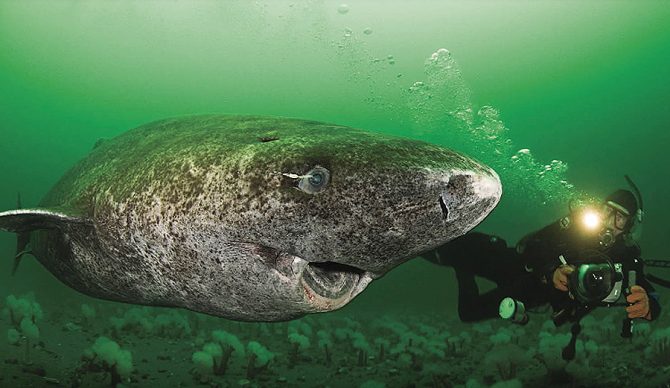
This is a Greenland Shark. It’s old. Like dude sitting out the back on a log talking about what this lineup was like before it got so crowded.
My retirement plan is to find a nice small surf break and paddle out every day until I need to strap a board rack onto the side of my walker. Then I’ll paddle out every other day. I have often wondered what I can do to keep the stoke as my body fails, as I miss more and more waves and get burned by the ever-growing population of gosh-darn groms that won’t respect their elders.
Personally, I have always enjoyed surfing with the old-timers, even though they are often characterized as grumpy old men. Sure, there may be an occasional deep-furrowed silver surfer ranting about the crowds or throwing old-man scowls at the swarms of younger aggressive surfers fighting over the chance to endlessly slam their potato chip-shaped boards into a wave face. But it has been my experience that if you take a minute to engage one of the elders in your local lineup then chances are you will find a witty humorous soul that has learned a thing or two about finding joy and appreciation from each wave — someone who is thankful for the glorious opportunity to still be on the water after many years.
How do you avoid becoming that grumpy old man or woman in the lineup? These are three simple rules for keeping the stoke as decrepitude creeps into your boardshorts. Because like most good things in a surfers life, the answers come from the sea. All you need to do is look to the oldest living vertebrate on the planet, the Greenland shark:
Rule #1: Maintain perspective. You are not the oldest thing in the ocean.
If you are feeling like a floating fossil in the line-up, remind yourself that recent studies have revealed Greenland sharks can live to be over 500 years old. A mid-sized 5-meter female shark was estimated to be between 272 and 512 years old. So get a grip, you will always be far from the oldest vertebrate in the water given that there are sharks in the ocean today that were born in the 17th century. To a five-meter, 400-year-old Greenland shark, no matter how old you may feel in comparison to the young guns cutting you off, you are barely a grom. And it is not just Greenland sharks that look at a geriatric surfer and think, “Puppies best stay on the porch.” The ocean is full of ancient animals. For example, there are deep sea clams that are over 200 years old, marine sponges that may be tens of thousands of year old, and jellyfish that can endlessly transmutate back to their larval stage – an immortal Benjamin Buttons. In the ocean, old is definitely a relative term.
Rule #2: Surfers are sexy — even the old ones.
Whether you are 21 or 71, there is no denying there’s something hot about a surfer. And as we age, it is important to remind our forgetful selves just how appealing surfers are compared to non-surfers. When you get to the point of having to drag your board across the sand or are only capable of charging ankle biting waves on your knees, realize that you are still head and shoulders above your landlocked buddies at the assisted living facility in terms of raw sex appeal. Case in point, cold water Greenland sharks spend most of their lives in the waveless deep oceans at depths of up to 2,000 meters. These lethargic non-surfing animals cannot even reproduce until they are over 150 years old. So they are literally 150-year-old virgins. Say what you want about the sex lives of the elderly surfer, they definitely have had more action in their short lives than a 150-year-old Greenland shark.
So the next time you are struggling to get your arthritic self into that neoprene, maybe contemplate the “dick-up,” a surfing term used to describe the common phenomena of surfers who are so stoked about the sport that they get aroused in their wetsuits. In that regard, the Greenland shark, regardless of age, has nothing on a surfer.
Rule #3: Chill.
Live hard and die young is not a practical paradigm for surfers. Think of all the waves you will miss. Want to keep the stoke? Stay alive as long as possible.
Exactly how do Greenland sharks survive for so long? Scientists have a couple of ideas and the most promising hypothesis seems to be that Greenland sharks have a very mellow metabolism in their cold water habitats. Think graceful slow wide turns of a longboarder compared to the thrashing spastic movements of a short boarder. If you want to stay happy and stoked in your golden years and you need to do is embrace the slow metabolism of a Greenland shark. Go out and buy the biggest board you can carry and glide into senility at about one foot per second, which turns out to be about the average cruising speed of a 400-year-old shark.
David Scholnick is a professor of marine biology at Pacific University in Forest Grove, Oregon.

